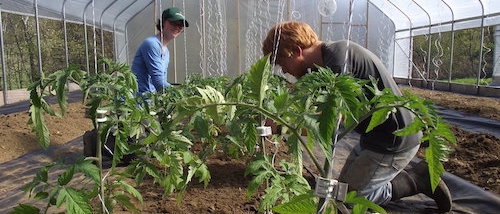Review the season while it’s still fresh in your mind
It is September. Two months or so until it starts snowing here in Québec. You’re in the home stretch. What’s the most important thing on this month’s to-do lists? Harvest those storage carrots and potatoes? Get the plastic on the greenhouse? Finish cleaning the garlic?
You should probably get all those things done, but what about sitting down and reviewing the season while the season is fresh in everyone’s mind?
A team season review is something we do every September at Tourne-Sol Co-operative Farm and it is one of the most significant ways we’ve figured out how to improve farm operations.
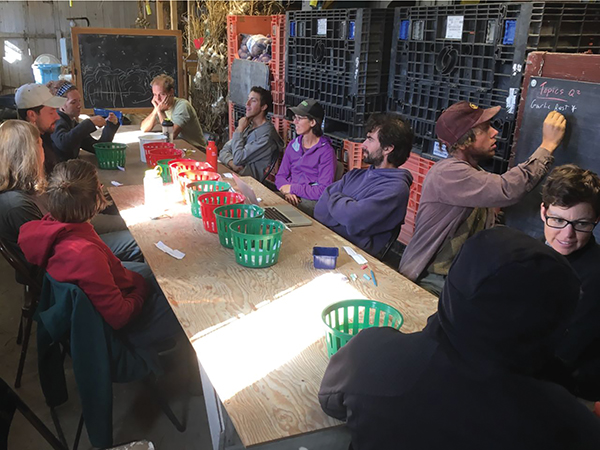 The Tourne-Sol Co-operative Farm team gathers to reflect on the season. All photos courtesy of the author.
The Tourne-Sol Co-operative Farm team gathers to reflect on the season. All photos courtesy of the author.
Let me walk you through the process. I’ll start by making the case for why it is important to have a TEAM season review rather than simply a personal reflection session. Then I’ll run you through how to conduct a season review so you get your team’s deepest reflections. And then we’ll look at what to do with what you learn from your team. I’ll wrap up with a few ways that we’ve improved Tourne-Sol Farm through this process.
Why ask your team?
It can seem risky to lock your whole team up for a couple of hours in peak harvest season to spend time reflecting instead of outside farming. And you might think you could do as good a job reviewing the season by yourself quietly.
But you have one weakness: You know how things have changed over the years, you know all the improvements, and you probably have the perseverance to force your way through minor lingering inconveniences on your farm. All of that makes you gloss over the challenges on your farm.
The folks who work on your farm see things as they are right now, and they get to suffer through the limitations of your tools and systems. And they see the gray spaces between all your systems.
And most importantly, you want your employees to come back and work with you next season and the season after that. There is nothing like great staff who stick around. And the best way to get them to stick around is by solving their biggest problems on your farm and by increasing what is already working.
How to run a team season review?
Step 1: Write some questions
Draft 6 to 10 questions that you would like your team to answer. You might be tempted to ask them about specific situations or instances that you knew were challenging on the farm this year. And those are important things to get more details about.
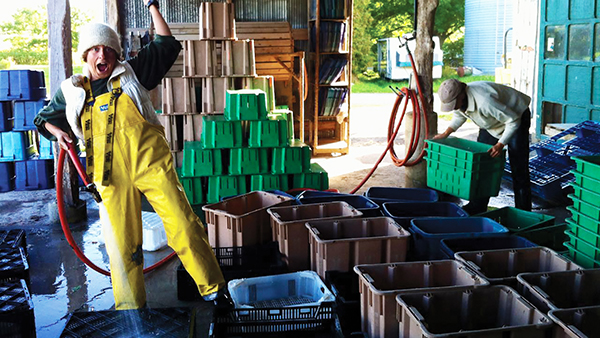 Washing harvest bins came up as one of those confusing areas on the farm. So, we took the time to create a clear system for each step of the process.
Washing harvest bins came up as one of those confusing areas on the farm. So, we took the time to create a clear system for each step of the process.
But you especially want to ask questions for which you don’t know the answers already and for which you’ll get surprising answers. These unexpected answers are what you’re looking for. This is not an exercise to validate your thoughts about the farm but rather to expose your blind spots.
You should ask some broad topics about Crops, Farm Operations, Workplace environment, and Sales & Marketing.
In the sidebar is a list of sample questions. I try to throw a couple fun questions in the mix like best farm song or best farm outfit.
Step 2: Turn the questions into a survey
Next set up an online survey with your questions. Google Forms is an easy way to do that.
I’ve set up a Google Form with these questions for you to get a head start at: http://spreadsheet.farm/teamreview. Feel free to use it as is or tweak the questions any way you wish.
You can also print the questions on paper and share them with your team. But one advantage of using a Google Form is that you can view the answers in a spreadsheet.
Step 3: Get your team to answer the questions
Share your questions with your team and ask them to answer them on their own. In this step you want their personal reflections, you’re not looking for group reflections.
Give your team a clear deadline by which to submit their answers to you. A week or two should give them enough time.
Step 4: Read your team’s answers and make a shortlist of important topics
Give yourself an hour to read through everyone’s answers. Make a list of any concrete items you definitely want to remember or act on. But also make a list of recurring topics that keep coming up and of anything that really surprises you.
Summarize this second list into 4-6 clear topics. These are the topics you should reflect on with your whole team as a group. You can share this list of topics with your whole team so they can start ruminating.
Step 5: Meet with your team to discuss those topics
Set 1-2 hours aside during the workweek where you get the team out of the field and around a table. Make sure there is coffee, tea, and treats. A whiteboard is also helpful.
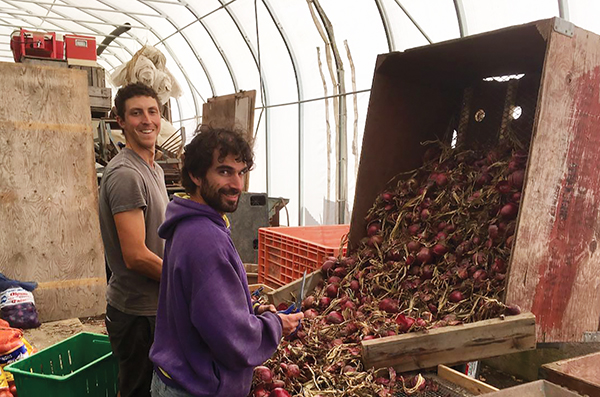 Our new and improved onion cleaning station, built around a bin tipper and standing up comfortably.
Our new and improved onion cleaning station, built around a bin tipper and standing up comfortably.
Use 10-15 minutes to discuss each topic to better understand the problem and explore possible solutions. Make sure you give room for everyone to speak and keep any one person from monopolizing the podium - this includes you! You should try to be mostly quiet and listen during this time.
It is ok that you don’t solve everything during these sessions. You’re just trying to better understand the topics and get your own brain thinking. Unfinished business is ok. Take a few minutes at the end of this discussion to thank everyone for their reflections and their time.
What to do with the feedback?
Take your lists and notes from this review and put them aside for the last couple months of the harvest season. You’ll still probably keep thinking about them while you’re farming but for now you can leave them in your brain.
A week or two after you wrap up your growing season, it’s time to take out those notes. Go through each note one by one and decide what you’re going to do. Some things will be easy, if your team says that there were never enough harvest bins, then you can buy some new harvest bins.
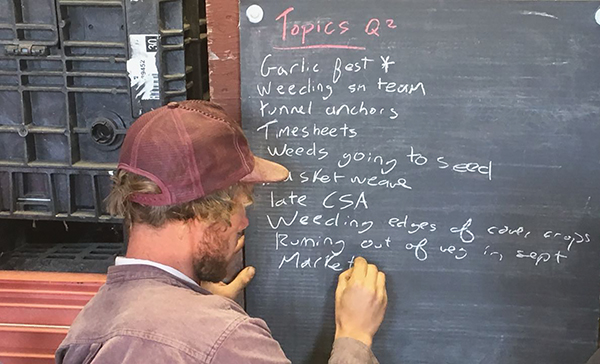 During the team review, someone always keeps notes from the conversations.
During the team review, someone always keeps notes from the conversations.
Some things will be bigger in scope. Your team might hate everything about your onion curing setup and you need to do a total overhaul. You probably can’t solve all your big challenges in one year. Choose one or two that you want to focus on in the coming year and make a plan based on your team discussions.
It’s ok that everything isn’t perfect next year, you just want it to be better than this year. Once you’ve made a plan, make sure to share it with your team so that they can see how their feedback is being used, and so they can get excited for how much better next year will be.
What kind of things do we learn on our farm?
We started this review process about ten years ago at Tourne-Sol Farm and it was amazing how much we learned immediately.
When we held our first team season review, we were drying our onions in a caterpillar tunnel and cleaning dry onions on our hands and knees. None of the Tourne-Sol farmers thought this was a great job but we wouldn’t have ranked it as the worst job on the farm. But the onion handling came back over and over in our employees’ responses. We realised something had to change.
Over the next few years, we set up a forced-air drying system and more ergonomic cleaning tables with a bin tipper. Onions no longer come up as a hated job on the farm. It’s become a social task where folks can chat as they clean up a storm. And we’ve dramatically reduced our onion processing time and increased our onion quality. We probably wouldn’t have put as much effort into these improvements if it weren’t for that team review.
Not all improvements need to include new machinery either. In another season review we learned how our staff were confused about how to clean and stack bins the morning after CSA and market. They were getting conflicting directions from different farmers and were getting a bit frustrated with it.
The solution was to write up a bin cleaning protocol and teach it to everyone on the farm. We’ve also made a lot of changes to our work schedules based on feedback from the team in these reviews and figured out how to improve communication.
Conclusion
In some years, our season reviews reveal more dramatic things than other years, but we always feel we’ve learned something after the process and the team also feels stronger. If you’ve never done this kind of review on your farm, I bet you will learn much more than you can imagine the first time you do this.
If you haven’t spent a lot of time asking your team for deep feedback, you might be really surprised how much insight they can give you. And the more you ask your team for deep feedback, you’ll realize that you don’t necessarily have to wait till the season is almost over to start getting feedback from your team. You could run a quick spring review or monthly review.
Another advantage to formal reviews is that your team will also get comfortable sharing their reflections informally with each other and with you even without being prompted by a formal review process! So, what are you waiting for? Go grab a pen and paper or a keyboard and write up some questions!
Dan Brisebois is co-author of the book Crop Planning for Organic Vegetable Growers and blogs at www.goingtoseed.net. He loves a good farm spreadsheet. Dan is also one of the farmers at Tourne-Sol co-operative farm. Tourne-Sol produces certified organic seeds and vegetables for their online seed store and 500 weekly veggie baskets.
